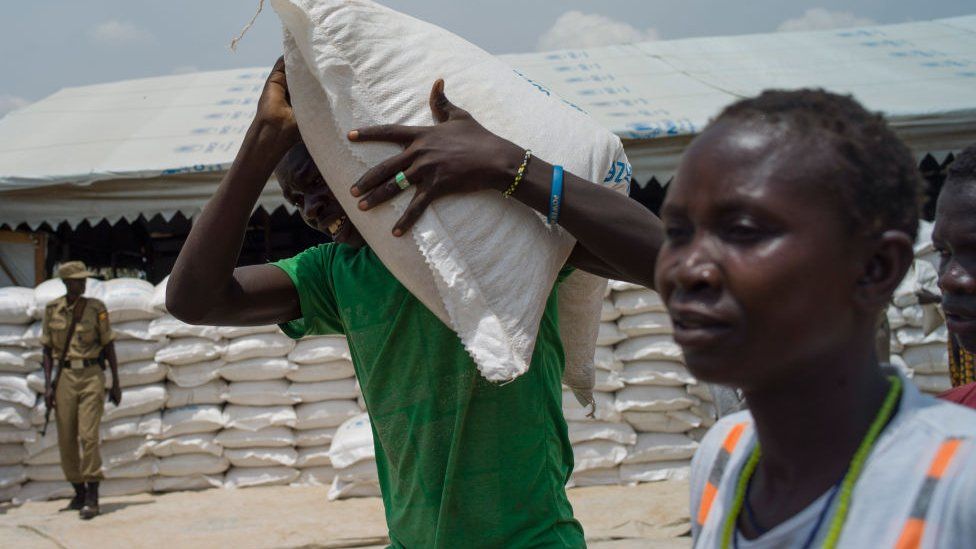Can US foreign aid be made 'smarter'?
- Published

Senator Bob Corker wants the US to manage its global affairs in a smarter way - but he's at odds with a president who wants to cut foreign aid drastically.
Sitting in a wood-panelled room on Capitol Hill, the Republican from Tennessee hardly looks like a rebel. He has puffy white hair and glasses that fall down his nose. Yet he's been fighting against the president on foreign aid.
On Tuesday, Corker presided over a hearing on the Multilateral Aid Review Act, a bill designed to save foreign aid, one of the core aspects of government work he believes has been imperilled under Trump.
Trump's budget included a call to slash funds to foreign aid by 28%. During the campaign, Trump said Americans should invest in their own country "and stop sending foreign aid to countries that hate us".
He has support among many conservatives. "The US can't solve longstanding problems that involve history and culture around the world, and we should admit that," says James Roberts, a research fellow at the Heritage Foundation.
Members of Congress are likely to fund the budget for foreign assistance at a higher rate, however, In the end, the budget for foreign assistance will probably be cut by only 5% in fiscal year 2018, say analysts. Funds for educational and cultural programmes, climate-change initiatives and other enterprises would be reduced.
But Corker wants to change the way foreign assistance is given out - as a way to strengthen it, he says.
The bill would create a system for evaluating international organisations that receive US funds such as the World Food Program, International Committee of the Red Cross and World Bank.
Members of a congressionally mandated task force would help to evaluate the organisations in terms of their mission, auditing practices, managerial salaries and other criteria.
It's tough love for foreign aid. "We owe the US taxpayers good value for their money," Corker said.
Many of those who work in international development support the undertaking.
A review process is "an avenue for a dispassionate discussion," says Friends of the Global Fight's Mark Lagon, a former deputy assistant secretary of state. Lagon says the process would help officials and others decide whether aid programmes are run efficiently.
The Multilateral Aid Review Act was modelled on a UK project. The UK's Department for International Development (DfID) has a similar system to determine whether they were getting their money's worth, and has issued two reports, one in 2011 and another in 2016.
The World Bank and many other organisations did top-notch work, according to their analysis.
Others fell short. In "organisational strength", the World Health Organisation was rated only "adequate".
Using this information, UK officials had a better sense of how to invest their resources. As a result UK government officials made some changes, a "reorientation of their budget", explained the Center for Global Development's Scott Morris, in the resources they provided for foreign aid.
Corker and other supporters acknowledge aid is expensive - and explain that's why they believe a review is necessary. In 2015, total US spending on foreign aid was $49bn, according to Congressional Research Service.
Still it's only 1.3% of the total federal budget, and funds aim to wipe out disease, alleviate hunger and make the world safer.
Foreign assistance by the numbers
- The US is the single biggest foreign donor, outspending the next largest, the UK, by more than $10bn a year.
- When spending on development assistance is measured as a percentage of gross national income, however, the US ranks in the bottom category.
- The biggest recipient of US foreign assistance is Afghanistan - followed by Israel and Jordan.
Corker has seen first-hand the benefits of foreign assistance. In a May op-ed, he described how he and fellow foreign affairs committee member Senator Chris Coons were shocked during their visit to Bidi Bidi, a refugee camp in Uganda. The senators said they wanted to make US food aid, desperately needed in places like Bidi Bidi, more efficient in order to stretch US aid further.
Corker's effort has been set against the backdrop of a fierce war between him and the president, especially after Corker announced he would not be running for re-election.
They've disagreed about the importance of foreign assistance way - and have traded insults.
Corker's bill has been approved in committee, paving the way for a full senate vote. Analysts agree that the bill has a good chance of eventually becoming law, though it may take several months or longer.
Follow @Tara_Mckelvey on Twitter